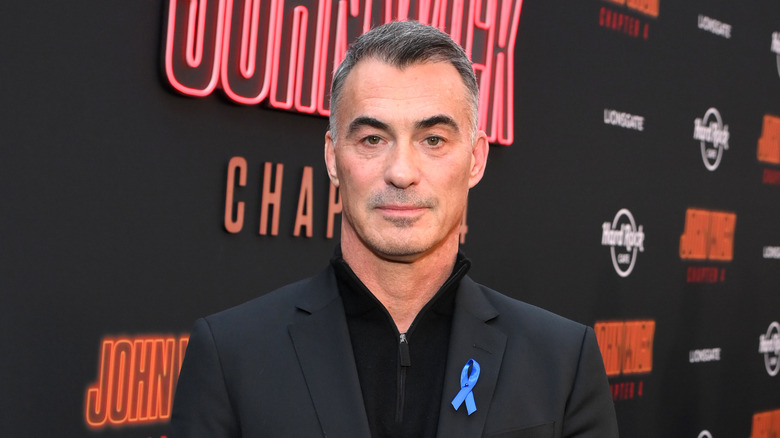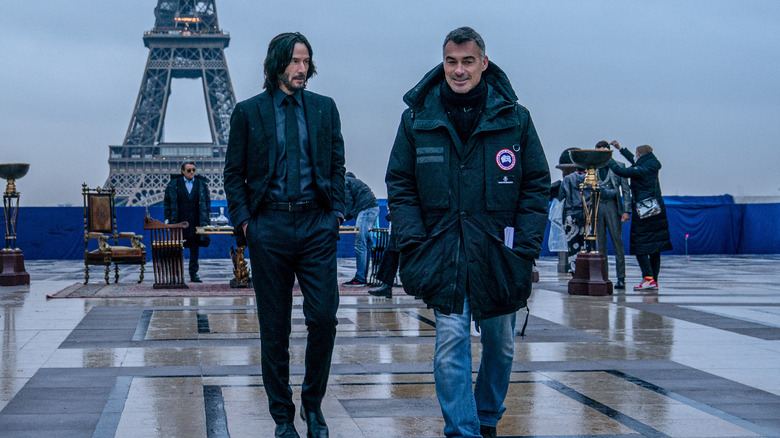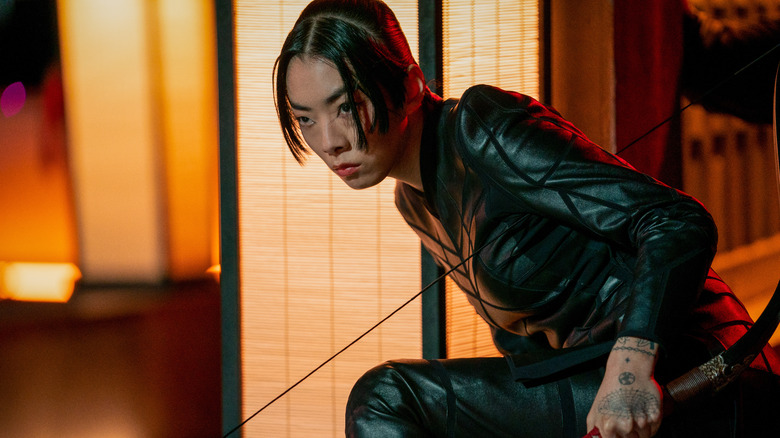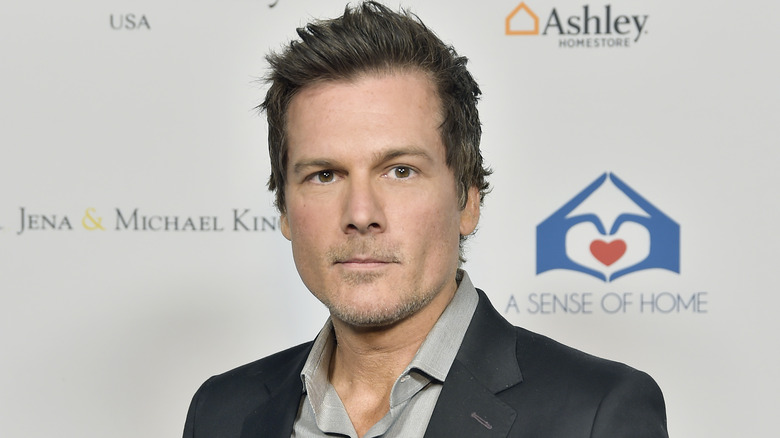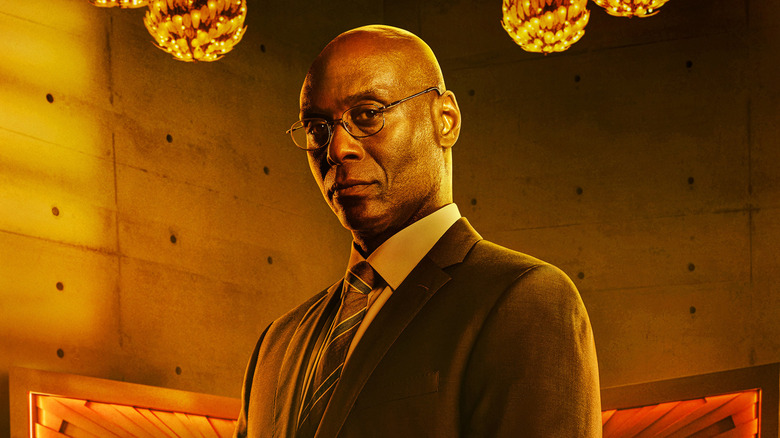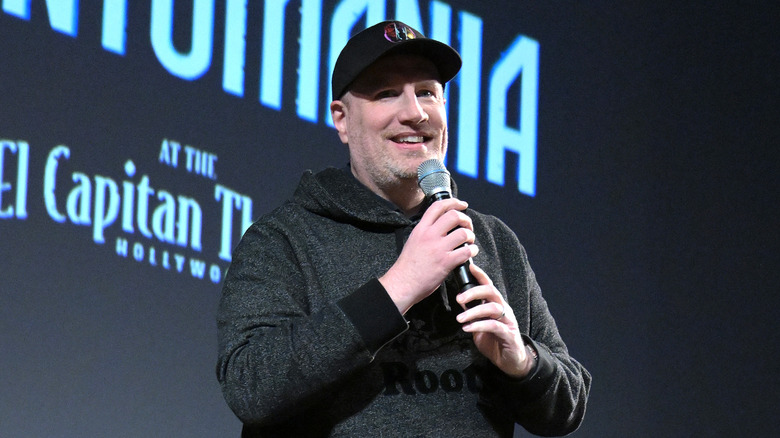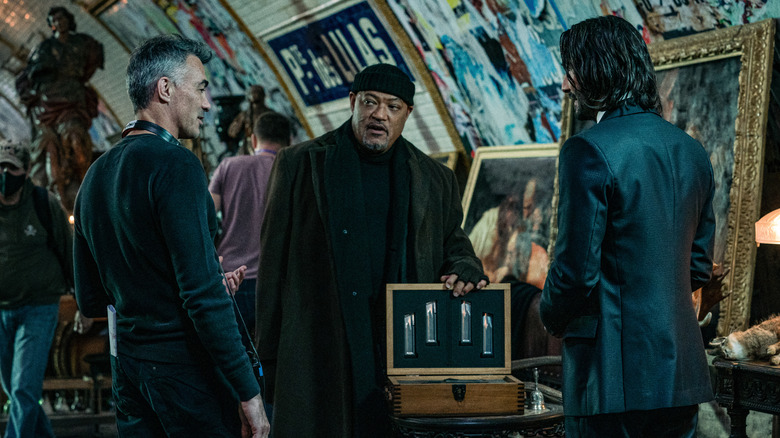John Wick Director Chad Stahelski On The Future Of The Franchise, Building A Universe, And More - Exclusive Interview
Contains spoilers for "John Wick: Chapter 4"
With the blockbuster success of "John Wick: Chapter 4," Chad Stahelski — who has helmed all four films in the surreal crime-action franchise — has established himself as one of the top action directors working today. The new movie is the series' biggest, not just in length (nearly three hours) but also in scope, as retired assassin John Wick (Keanu Reeves) and his allies (Ian McShane, Laurence Fishburne, and the late Lance Reddick) try to free John from the High Table's global criminal underground once and for all.
New characters include John's old friend Caine (Donnie Yen), recruited by the High Table to snuff John out, as well as freelance hitman the Tracker (Shamier Anderson), who's given the same task. Then there's Osaka Continental manager Shimazu (Hiroyuki Sanada) and his daughter Akira (Rina Sawayama), the latter of whom plots her own revenge once John brings chaos into her and her father's lives.
With all these characters and an ever-expanding universe, it comes as a bit of a shock to see John Wick die at the end of the film, just as he's finally earned his liberation. Or does he? Whether John survives or not, all of these characters could spin off into their own stories. Plus, with director Len Wiseman's "Ballerina" (due out June 2024) and the "Continental" TV series, the franchise is already sprouting new branches.
In Looper's exclusive interview, Chad Stahelski talked about the impressive growth of that world, from its roots in his weird, scrappy little directorial debut, along with its future and what he might do next. "Whether or not we do a 'John Wick 5,' I don't want to let down expectations," Stahelski said. "I know what I'm good at. I know what I suck at."
Giving John Wick the right send-off
How and why did you and Keanu land on the idea that you were going to end it with John passing away?
That was the very first thing we started with ... It was two things. I was reading this book, because we were in Japan at the time, called "Hagakure." It's an 18th-century treatise on the samurai code of ethics. It's literally the way of dying for samurai. We thought that was cool. You could only have a good death after a good life and the whole samurai mentality of that. Then Keanu was like, "Well, because we've done three movies that were fairly linear — but they were a little disjointed because we did each one individually without a plan — wouldn't it be cool if we did at least one more, and we tied them all together and we gave John Wick a conclusion to his journey?"
We started talking about some of the things, and we're like, "Oh, that sounds pretty cool." Then Keanu lights up in his way, and he was like, "John Wick's got to die." I'm like, "Okay, come again?" He's like, "No, this is the only way out. You've been saying it. We got to do this ... but he's got to die on his terms." So that was literally the first idea that we had. What's the Japanese code? What's the real question? What's the good death? The good death is obviously living a good life, but John Wick hasn't — so in his last 48 hours, how does he live a good life? This is how we did it.
The head of Lionsgate, Joe Drake, said after the movie opened that they're interested in keeping the series going. The writers, Shay Hatten and then Michael Finch, said that the ending's open to interpretation. Would you agree?
There's my opinion and there's the objective opinion. The objective opinion is, who died? John or John Wick? That's why we left at the dog looking up — what's he looking at? They don't know. Again, storytelling-wise, I've always loved novels, books, any property that lets the audience invest themselves in it. The cool part is when you don't know. I want a lot of things answered for me sometimes, but I also want a few things left open because there's hope. It's not just a solid ending. I'm never big on riding away into the sunset with everything tied up nice and neat. I like a little sloppiness to the endings, as you can tell. That's one thing I was going for.
But it's always open-ended. We've seen how many characters resurrected in other franchises? But in our minds, at least, John Wick died. Now, is John dead with him? Is the human dead, or is just the myth of him dead? I don't know.
If someone asks you for more of what you love doing ... the biggest response becomes not just to do it, but to do it well so that I don't let down the expectations of people that want it. So the real question to me is, do I believe I'm a good enough storyteller [and] director? Do I have something that won't let all of you down? Right now I don't. That could change tomorrow.
Leaving the ending open and expanding the world of John Wick
You did shoot a couple of different variations on the ending, with the one you ultimately didn't use a little more ambiguous about whether John died.
Yeah, we shot two endings. I'm being very gracious to the studio right now. It wasn't [forced]. They asked in the nicest way. They knew how strongly Keanu and I felt about it. There was a little bit of a heated debate, but at the end, they're like, "Take half a day, shoot an alternate ending, and we'll test both." We started thinking about it — you have your ego, but then you're like, "We want to make the best movie. What do I know? Let's try it. Sure." But we did our best job we could. We shot a cool ending, we shot a second ending, and we tried both. We knew right off the bat what the more powerful structure was, but I learned a lot as a director, testing both and seeing audience reactions and noticing how big of a change it actually was between test audiences.
This world gets richer with every film. Are there ideas for films or shows based on the other characters, like the Bowery King or Caine, or even Akira?
The phone calls are coming in, and Joe Drake and Nathan Kahane, the motion picture head and the head of Lionsgate, they're very enthusiastic. They've been incredibly supportive. Nothing's better than Monday morning when you're getting that call: "Hey, the weekend went good. Let's talk." That's fun.
The Bowery King was originally started on the second "Wick" to be this little part because Keanu called me one day in the writing process. He goes, "Hey, I just bumped into Laurence Fishburne in New York and he's like, 'What the f***? Put me in, coach.'" I was like, "You're kidding." Keanu was like, "No, he's serious. He'd love to work with us again." That part was written for Laurence Fishburne, but it's a small little peek in that world ... and the more we wrote that part, we're like, "Oh my God, if I could do a whole underground movie like that, I'm in." Absolutely. That would fascinate me.
Now we're on "Chapter 4," and if I had to put my money somewhere, I would love to see what happens with Caine. But I want to watch what happens to Akira next. I'm a big Rina Sawayama fan, so that's the one I'd want to follow. Bowery King, Rina, Donnie ... those are all, even Shamier, the Tracker ... I'm very proud of this film, my cast, and my crew. But I'm interested in the fact that you and I sit here and talk like, "Hey man, we'd love to see more of Donnie Yen's character. Wouldn't we love to see Rina's character?" That means we did something right. That's the biggest note to take away.
On Len Wiseman directing Ballerina
How involved are you in "Ballerina"? Is Len Wiseman taking the ball and running with it, or does he check in with you?
Funnily enough, I worked for Len when he was directing "Die Hard 4" as a stuntman. We've known Len a while in a professional sense. "Ballerina" was written as a standalone thing. Then it was close enough to the "John Wick" world that they modified it. They asked me about Len, and I was like, "Oh my God, this is great." I love Len — he's a very visual director. He's great. Very happy with that.
Len was very collaborative coming in. I was not that far into post on "John Wick 4" when Len came in to develop "Ballerina." We spent a lot of time in post looking at all our color palettes, our lenses — he got my philosophical standpoint on all the riffing, on how we put it together. But Len was handed a script, and he is trying to make it to fit into someone else's universe. That can be, for some people, very restrictive or very limiting.
I [spoke with Len and said], "Look, you're being incredibly gracious. Thank you so much for including me. But to make it good, you've got to do your thing. Here's the ball. Go run with it." You try to get across thematics and tone and all that, but if you're not the director on it, you have to let the director do his thing. That's why you hire somebody like Len. He's got a style. He's got a way of doing things, his interpretation of it.
Also, for audience members, it's good that you get a little different perspective on it. We had a good initial talk about the world of "John Wick" and concepts and theories and looks and all that stuff. Then it was handed to him to develop ... I've seen a lot of the footage, and to Len's credit, it's visually interesting. It's different than "Wick," but in the same vein. It's got its own identity, and that's what you want.
Remembering Lance Reddick
Keanu, Ian McShane, and Lance Reddick all appear in "Ballerina" as well. Can you talk about Lance and his contributions to this series?
Lance is a beautiful human. He's a gentleman's gentleman. He is all of that. But what's much more interesting is his influence. Lance was one of the first people we ever cast on the first "John Wick." He's one of the first people that we ever pitched this nutty idea to, and he got it. He's like, "I'm all in. I'm Charon. I'm the gatekeeper. I'm on the river Styx. It's Greek." He got it quicker than almost anybody else out there.
You've got to remember, no matter how many second unit gigs or fight jobs or stunt work I've done, I'm still new — a first-time director. There's a lot of things you have to learn that you're not going to learn until you're in the seat. It's so important to get an experienced cast that you can talk to and that you can trust and that you can actually say, "Hi Lance. I'm Chad. I'll be your director. This is my first time. I think I know what I'm doing, but probably not." Lance and Ian McShane, every one of these cast members — they're supposed to be working for me, but they're like my mentors at the same time.
You have somebody like Lance, that we grew up watching on "The Wire" and all these video game things and 20 other TV shows, and now he's standing in front of you and he's helping you develop a character. You stand a little taller. You become a little bit more articulate with Lance and say, "This is what I'm trying to go for." He'd ask the right questions. He was always good at going, "What are you trying to get? What are you trying to say? What's in your head?" He was very inquisitive, and he'd come back the next day and go, "Okay, well, I'm going to have an African accent. I'm going to do this. I'm going to be your gatekeeper." He was such a big part of the Continental world.
The first day we met, it was two stunt guys sitting at a table trying to talk him into doing their tiny little movie where we kill a puppy. The fact that he was so gracious, never made us feel little or small, and he made us feel like it was the greatest project he's ever been offered and he'd love to be a part of it — it gave us hope that I'll never forget.
How Marvel's Kevin Feige helped out with John Wick
You directed second unit on "Captain America: Civil War." What did you learn from working with that group about creating a shared universe?
Heaps. The Russo brothers were so cool to us. I've shot second unit for them more than a few times. They were fantastic — incredibly good guys. Look how much they influenced Marvel. Also through working with them, I got to meet [Marvel Studios head] Kevin Feige and [develop a] working relationship.
When I got to do "John Wick," and we ended up trying to go the next step to "John Wick 2" and "John Wick 3," between "2" and "3" and then "3" and "4," I called his people and asked, "Hey, I know Kevin's real busy. Would he mind a meeting?" You could imagine how busy Kevin is, but both times, he sat me down and gave me a few hours of his time in both instances. He was like, "Okay, how can I help?" I was like, "Look, man, I got this 'John Wick' thing. Give me some advice. What's the best way to handle this? Some people see this as a one-off. Some people see it as a cash grab."
To Kevin's credit, he goes, "What do you think?" I told him what I thought, and he very graciously gave me his thoughts on world-building and franchises. I don't know if you've ever interviewed Kevin, but you're not talking to a businessman. You're not talking to an executive. You're talking to a fan. Whatever he's telling you, he can't help himself from smiling. Regardless of strategies or methodologies of building a franchise, the one thing that comes across is "I love what I do. Follow your heart, follow your gut, be respectful to the fans. Do what you want to see, and you're going to be okay."
As far as how to do that, he's like, "I have 75 years of IP. You've got one movie, so it's going to be a little different." He hits you with the reality. You got to earn it, man. But one of the bits of advice I got is make characters you love. Very similar to what the Wachowskis taught me ... [he was also] like, "Make every frame, make every moment count." There are no throwaway scenes, there's no throwaway performances, there are no background players, foreground players — everything in front of that camera, you got to make it count. "John Wick 4" is a culmination of that, and that comes from the Russos, the Wachowskis, and Kevin driving that home for me.
Have you ever talked with him about directing something for Marvel?
In recent months, I was asked to come in and talk about a project. I don't think it was the right fit, nor was it the right timing, because I still had to finish "Wick" ... [but] I can't be more gracious and more thankful. That's flattering — if Marvel calls and offers you a gig, at least you're on the radar. Of course, it's a huge ego boost. It's amazing.
But just like whether or not we do a "John Wick 5," I don't want to let down expectations. I know what I'm good at. I know what I suck at. I get it. You put me on a romantic comedy, I'm going to stumble. It could be a $10 million movie, but I'm probably going to mess it up. I don't consider myself a very funny guy. But sci-fi, action, world-building, mythology, and that weird kind of chivalry — I'm all in that. That's my zone.
If any studio called and said, "Hey, we want to develop a character from scratch," that's me. I'm your guy. To somehow take something that's already so baked in the fans' minds, I don't know. I don't think I'm very good at adaptations. I'm much better at building from the ground up. But if that were to happen, it's not out of the range. It's always a pleasure to work for people that love what they do. I'm not going to say yes, I'm not going to say no. It's really an individual thing.
What's next for Chad Stahelski?
What's a genre that people would be shocked to hear that you would like to try?
I'm a musical super freak. I f***ing would love — I saw Walter Hill's "Streets of Fire," and I was like, man, that was a swing. That took balls to do that movie ... Whether it's hit or miss, whether you like it or don't like it, I thought it was pretty inventive. But if you gave me "Streets of Fire" meets "West Side Story" meets "La La Land," and you put in some action, I'd take a swing at that.
You have a number of potential projects in your future, including a reboot of "Highlander." You've been associated with that for a while. Is that still a going concern?
Still working on the script a little bit ... Look, we know it's a great franchise. It's a little tough to crack because when there can be only one and you kill the one, you don't want to paint yourself into that corner quite yet. It's something I love. We know how deep the mythology is, but the trick is, there's no purpose in going back and remaking the original. The first one was good, bad, awesome, quirky, fun, all wrapped into one. Perfect timing. The way they shot it with the fisheye lenses and the quirkiness — at the time, it was awesome. It was a great thing. To try and remake it and try to keep it serious or to try to give it anything but an original perspective would do it a disservice.
The real trick with "Highlander," what I'd love to do, is bring about that mythology of immortals and the burden of immortality and all that means. At the end of the day, it's a love story. If you can keep that through and make it fun — people tell me, "It's 'John Wick' with swords." Yes, that would be awesome. I'd go see that movie for sure. But we're in a different time now ... can you crack it and keep it interesting and keep it grounded? I don't know.
There's a lot to consider there. It's something we've been working on pretty hard for the last six, seven years. We've made amazing headway. It's something that I really hope does go — whether I'm the director on it or not, I think it should go. It's a great property. But it's taking everything you love about that world and coming up with [an] original perspective on it.
"John Wick: Chapter 4" is in theaters now.
This interview has been edited for length and clarity.
